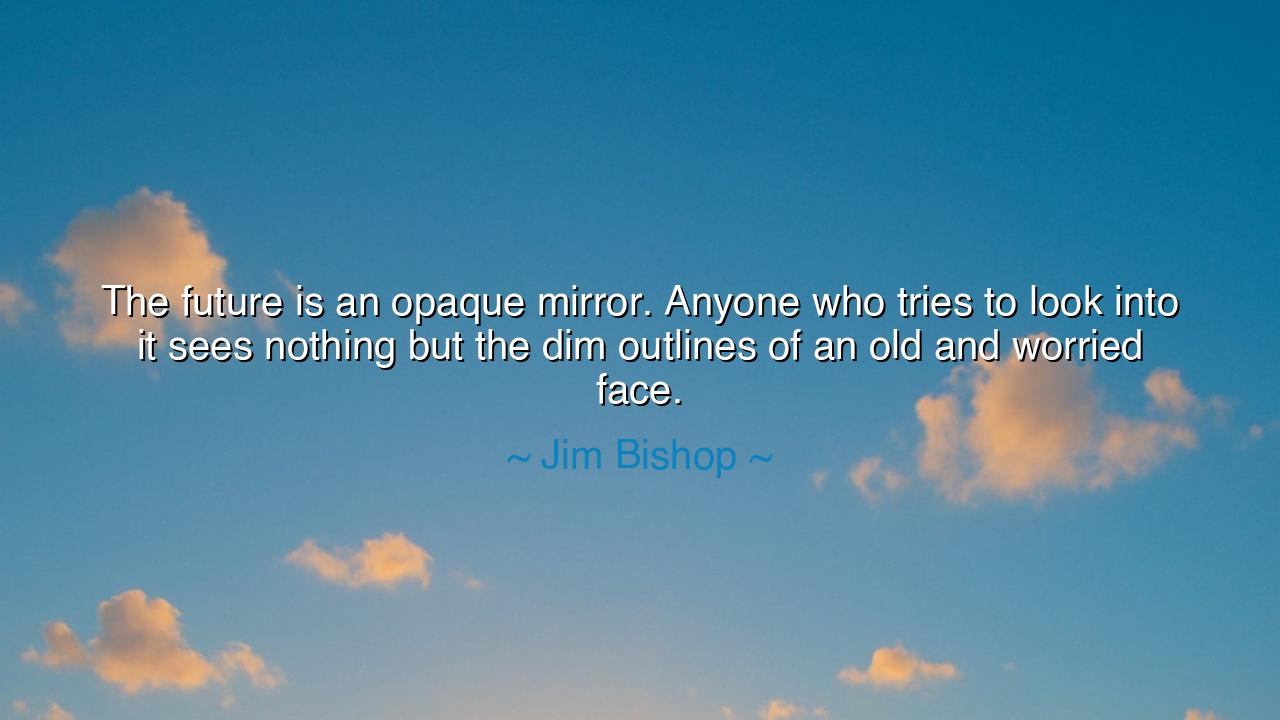
The future is an opaque mirror. Anyone who tries to look into it
The future is an opaque mirror. Anyone who tries to look into it sees nothing but the dim outlines of an old and worried face.






"The future is an opaque mirror. Anyone who tries to look into it sees nothing but the dim outlines of an old and worried face." With these words, Jim Bishop captures the very essence of the human condition: our inability to fully comprehend the future and the anxiety that arises from this uncertainty. The future, like an opaque mirror, is shrouded in mystery and obscurity. No matter how hard we try to peer into it, we are confronted not with clarity but with the faint, distorted images of our own fears, hopes, and doubts. It is the unknown that causes us to become consumed by worry, as we seek to control what cannot be known, and in doing so, we often look at it with a nervous gaze, reflected back at us as a tired, aging face—a symbol of our anxiety and vulnerability.
In the ancient world, prophets and seers were revered for their ability to glimpse the future. Yet even they understood that the future is not a realm easily accessed. The great Greek philosopher Heraclitus spoke of change as the only constant in life, a force that is ever-present, yet unpredictable. He acknowledged that the future was a river, always flowing, never fully understood. The Oracle at Delphi, famed for her prophecies, spoke in riddles, aware that the future is not meant to be fully grasped but experienced as it comes. Her words often left listeners with more questions than answers, and yet this uncertainty, too, was part of the wisdom—acceptance of the unknowable and the transient nature of life itself.
Bishop's metaphor of the opaque mirror reflects the uncertainty that has always existed about the future. To gaze into it is to encounter not a clear vision of what will be, but a blurred image, shaped by the influence of our past and the worries of the present. The image we see is distorted by our fears and desires, and often, it is not the future we are truly confronting, but our own anxiety about it. This is a timeless dilemma. Just as Cassandra in Greek mythology could see the future clearly, yet could not change it, so too do we face the paradox of knowing that the future is coming, but never being able to fully understand or control it.
Take, for instance, the story of King Croesus, the last king of Lydia, who sought the wisdom of the Oracle at Delphi before embarking on a war with the Persian Empire. The Oracle warned him that if he attacked Persia, he would destroy a great empire. Misinterpreting this cryptic message, Croesus attacked, only to have his own kingdom fall. In his anxiety about the future, he had sought certainty, but was instead given a riddle—a distorted image of the future, shaped by his own desires. This is a clear example of how our attempts to peer into the future are often clouded by our assumptions and fears, and how they can mislead us if we do not approach the future with humility and clarity.
The lesson of Bishop's quote, then, is one of acceptance and courage. It teaches us that the future, much like the mirror, will never provide us with a clear reflection. It is not meant to be seen in sharp focus or with complete certainty. The more we attempt to control or predict it, the more we risk distorting our view, seeing only the worries and doubts that lie within us. Instead of living in fear of what is to come, we must learn to embrace the mystery of the future and find peace in the present moment. The past cannot be changed, and the future cannot be fully known; only the present is ours to live.
Like Socrates, who emphasized the importance of examining one’s own life rather than trying to predict or control the world, we must focus not on the future but on the choices we make today. By living with purpose, embracing the unknown, and acting with integrity, we shape the future through our actions. Epictetus, too, taught that we must focus only on what we can control—our own thoughts and actions—while accepting that the future is beyond our grasp. It is through the cultivation of wisdom and virtue in the present that we create a future that is worthy of our efforts, even if we cannot fully see it.
Therefore, the call to action is clear: let go of the need to control the future. Live in the present, where you can make a difference, and trust that the future will unfold as it must. Do not be consumed by worry or fear about what is to come. Instead, let your actions be guided by the wisdom of the ancients—by the understanding that the future is unknowable, and the present is all that we truly have. In doing so, you will find peace, clarity, and the courage to face the unknown with confidence.






AAdministratorAdministrator
Welcome, honored guests. Please leave a comment, we will respond soon